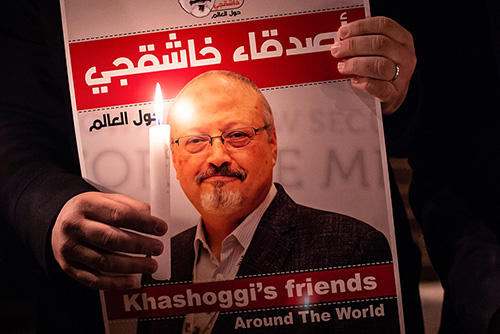The fight for justice in Jamal Khashoggi’s murder
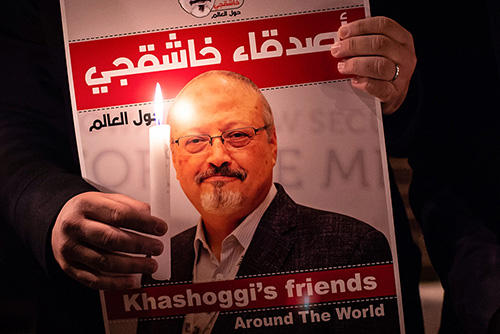
It took the Saudi royal family more than two weeks after Jamal Khashoggi disappeared to admit that he had been killed in the country’s consulate in Istanbul. Saudi officials said the murder was a rogue act, but, according to The New York Times, several of the men dispatched from Riyadh to kill the Washington Post correspondent were members of Crown Prince Mohammed bin Salman’s security detail.
Saudi Arabia has faced international condemnation, but in the month since Khashoggi was murdered, no progress has been made in the case
However, as CPJ Executive Director Joel Simon outlined in a post in October, there still are paths to justice in the case, starting with a methodical, systematic investigation.
Among them:
- The U.N. establishes an international investigation, which could form the basis for punitive actions against Saudi Arabia, including a criminal case under the U.N. Convention against Torture.
- The U.S. State Department completes a preliminary investigation into Khashoggi’s murder within 45 days, by November 16.
- The FBI explores possibilities, including securing a request for cooperation in the investigation from Turkish officials.
- Khashoggi’s children and The Washington Post bring civil claims in the U.S.
CPJ continues to call for Khashoggi’s killers, and the mastermind behind the attack, to be held to account. On November 2, the International Day to End Impunity for Crimes Against Journalists, CPJ participated in a memorial service and discussion organized by the Justice for Jamal coalition.
Join us. Use the hashtag #JusticeForJamal to call for justice in Khashoggi’s murder.
CPJ joins call for Maltese prime minister to secure justice in journalist’s murder
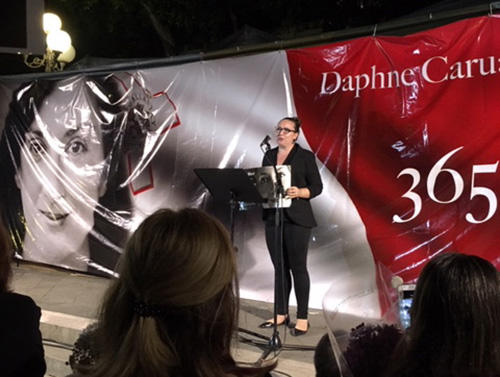
In mid-October, CPJ joined press freedom groups as part of a delegation to Malta to mark the one-year anniversary of the murder of investigative reporter Daphne Caruana Galizia.
“What we found was that there has been no progress into who ordered Daphne Caruana Galizia’s murder,” said CPJ Advocacy Director Courtney Radsch, who participated in the mission.
The delegation, which included Radsch and CPJ’s EU representative, Tom Gibson, met with a series of officials, including Prime Minister Joseph Muscat, Minister of Justice Owen Bonnici, and Attorney General Peter Grech–all of whom are responsible for ensuring that Caruana Galizia’s killers are brought to justice. They assured CPJ and the other groups that the investigators were allowed to pursue all leads, including high-level political and business figures. Yet, when CPJ asked the officials whom we met, as well as the journalist’s colleagues, not a single one of them said they had been interviewed.
The delegation urged Muscat to establish a public inquiry into whether Caruana Galizia’s murder could have been prevented. Although he repeatedly agreed to the delegation’s request, he said the government had been advised not to do so until the murder investigation had concluded. There is no deadline or timeline for the completion of the investigation.
“Maltese authorities should realize that the country’s image in the international community is being tarnished,” said CPJ’s Radsch. “One of the first things they can do to begin repairing it is actively seek full justice in Caruana Galizia’s murder.”
Following the mission, CPJ and the other groups issued a set of recommendations to Maltese authorities, including to guarantee freedom of information and ensure a safe environment for the independent media.
CPJ publishes report on chilling effect of U.S. border stops
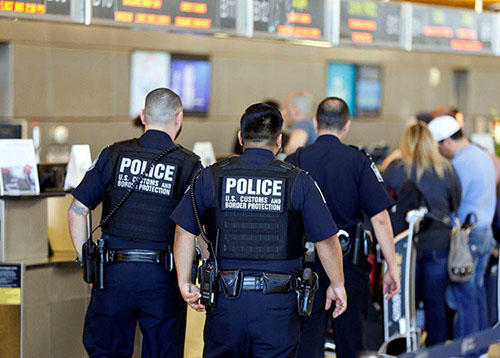
Canadian journalist Ed Ou was used to traveling through authoritarian countries, so he knew that he should secure his electronics beforehand. But, he told CPJ, he “was never prepared to have to do this in a liberal democracy like the U.S.”
Ou said that when he was headed to the U.S. to cover the Standing Rock protests in October 2016, border agents denied him entry to the country after he refused to give them the passwords to his electronic devices. He was also told that “covering a protest is not a valid reason to come into the country.”
Ou’s case is not isolated.
Earlier this year, CPJ and Reporters Without Borders sent an open call to journalists who had been stopped at the border. We identified nearly 40 journalists who said they found secondary screenings at borders invasive. And, in a report that CPJ published earlier this month, called “Nothing to declare,” we found that a government agent’s ability to examine a journalist’s equipment–without a warrant–risks undermining press freedom. We met with the U.S. Customs and Border Protection to raise our concerns last week.
Read the report here and check out the accompanying documentary.
CPJ wins 2018 Chatham House Prize
On October 8, London’s Royal Institute of International Affairs announced that CPJ had been named the winner of the 2018 Chatham House Prize.
The award is presented each year to the person or organization that Chatham House members believe had made the most significant contribution to the improvement of international relations the previous year. Chatham House recognized CPJ for its efforts to defend the right of journalists to report the news without fear of reprisal at a time when press freedom is under pressure in many parts of the world.
CPJ will accept the award in London later this month.
CPJ 2018 awardee released from prison
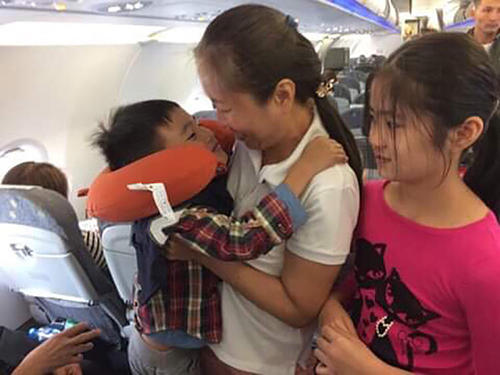
In October, Vietnamese blogger Nguyen Ngoc Nhu Quynh was released from prison and reunited with her family.
Quynh, also known by her penname, Me Nam or “Mother Mushroom,” has been behind bars since 2016. (Read more about her here.) She will now join us at CPJ’s 2018 International Press Freedom Awards dinner, where she will be honored for her perseverance and courage in the face of repression.
The dinner, which is scheduled to be held at the Grand Hyatt in New York, will also honor Sudanese journalist Amal Khalifa Idris Habbani, Venezuelan reporter Luz Mely Reyes, and Ukrainian broadcast journalist Anastasiya Stanko. CPJ will present the 2018 Gwen Ifill Press Freedom Award to Philippine journalist Maria Ressa.
For more information on tables and sponsorship, contact Buckley Hall Events at (914) 579-1000 or [email protected].
AT&T donates $250,000 to CPJ
In late October, AT&T announced that it was making a $250,000 gift to CPJ “in light of numerous recent events around the world where journalists have been threatened, harmed, and even killed.”
AT&T’s unsolicited and unrestricted support comes at a time when press freedom is under siege globally. Since the murder of Washington Post columnist Jamal Khashoggi at the Saudi consulate in Istanbul this month, CPJ has helped lead the call for an international investigation into his murder, and has also urged the U.S. State Department to conduct an expedited inquiry.
“Journalists serve as an indispensable check on power,” AT&T CEO and Chairman Randall Stephenson said. “They do the hard and often unpopular work of shining a light on issues that matter, so that people are better equipped to make decisions for themselves.”
CPJ joins the board of the Press Club Brussels
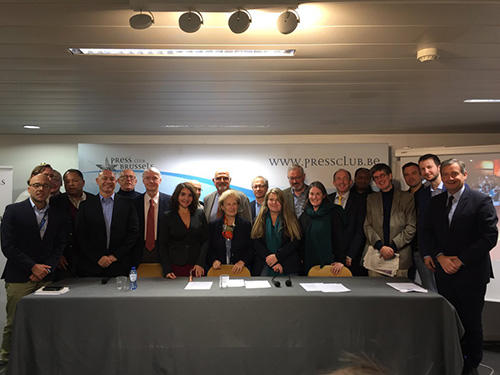
In late October, CPJ joined the board of the Press Club Brussels Europe, following an invitation by the club’s executive director, Laurent Brihay.
CPJ’s EU representative, Tom Gibson, who is based in Brussels, spoke to the club’s general assembly and provided an overview of CPJ’s work, history, and activities. “We are greatly looking forward to our advisory role within the Press Club Brussels to support its ongoing projects and to continue our engagement with the journalist community in Brussels,” Gibson said.
The Press Club Brussels, which presides over the International Association of Press Clubs in 2018 and 2019, provides a place for journalists and press clubs to interact with European embassies and representations, including in press conferences, public debates, and other events. It also promotes partnerships with other press clubs around the world.
Must-reads
In CPJ’s annual Impunity Index, published this month, we found that in 85 percent of journalist murders, the killers are never held to account. This emboldens those who seek to censor and control the media through violence. Read CPJ’s 2018 Impunity Index here.
In a statement following the killing of Viktoria Marinova, presenter of a Bulgarian TV channel, CPJ called on authorities to conduct a rigorous and thorough investigation into her death. At least two investigative journalists have been killed in EU member states in connection with their work in the past 14 months.
In October, CPJ published a news alert describing how staff at the Russian newspaper Novaya Gazeta were sent a funeral wreath, a severed goat’s head, and threatening notes. The paper, one of the last independent news outlets in Russia, is critical of President Vladimir Putin and his government.
CPJ in the news
“Istanbul has felt like home for Arab exiles. Khashoggi’s killing has them scared,” The Washington Post
“Turkey should seek UN inquiry on Khashoggi,” Bianet
“The disappearance of a Saudi critic signals a broader danger for journalists,” The Atlantic
“Turkey slams Saudi Arabia for Jamal Khashoggi’s death despite its own dismal record on press freedom,” CNBC
“Erdoğan cannot claim moral high ground over Khashoggi, say critics,” The Guardian
“CPJ: Impunity in journalists’ killings creates ‘entrenched’ climate of censorship,” Radio Free Europe/Radio Liberty
“These 14 countries allow journalists to be killed with impunity,” Poynter
“Prosecutors: Suspect paid thousands of euros to have Slovak journalist killed,” Voice of America
